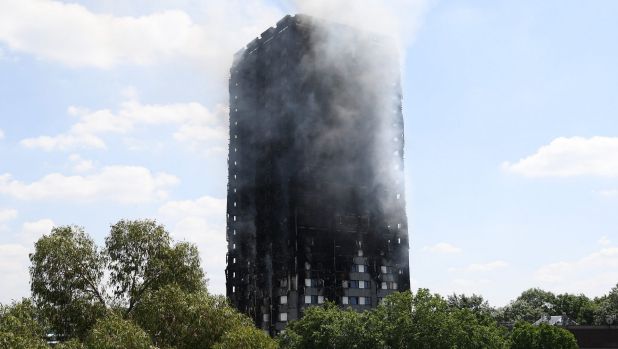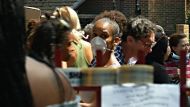London: British Prime Minister Theresa May has ordered a full public inquiry into the Grenfell Tower fire as emergency services raised the death toll to 17 – with further bodies expected to be found in the top-floor flats and fears some victims may never be properly identified.
"Right now people want answers," Mrs May said in a recorded statement from 10 Downing Street.
More World News Videos
Community rallies for London fire victims
While charities bemoan the lack of official direction for helping London fire vicitms, the community is pulling together in mourning and mutual support..
"We need to know what happened, we need to have an explanation of this. We owe that to the families, the people who have lost loved ones, friends and those homes in which they lived.
"People deserve answers and the inquiry will give them."
The Prime Minister's demand for the "terrible tragedy" to be "properly investigated" echoed calls from London mayor Sadiq Khan and Labour leader Jeremy Corbyn for answers after the blaze left residents in the 24-storey tower block fleeing for their lives.
Mr Corbyn, during a visit to the scene in west London, said the "truth has got to come out and it will". The public were "very unhappy and very uneasy today and tonight – they need answers, they need reassurance," he said.
The first victim of catastrophic blaze was named on Thursday as Mohammed Alhajali, a 23-year-old Syrian refugee and civil engineering student who the Syrian Solidarity Campaign said dreamed of one day being able to go "back home one day and rebuild Syria".
"Mohammed's older brother Omar, who was with him in the flat, survived but lost Mohammed on the way out," the group said in a statement on its Facebook page.

Policing and Fire Minister Nick Hurd said anger in the community over the tragedy was "quite understandable" and the government needed to listen.
"We have to act and think as if it was our friends, our family in that building," he said, adding he had told officials "there's no room for cool, detached, plodding bureaucracy at this moment".

New Housing Minister Alok Sharma said many people across the country in high-rise towers would be wondering about the safety of their own homes.
He told a parliamentary committee that his department was talking to local authorities and housing management organisations across the country about how to get checks quickly on buildings.

He also said a long-awaited review of building regulations was "almost ready".
Conservative MP Vicky Ford said people who worked in tall buildings "will be fearful" and asked this also be considered in a review or inquiry.

Earlier, emergency services leading the operation in north Kensington warned that the death toll was likely to rise further – with specialist search and rescue teams expected to enter the devastated building imminently.
London Fire Commissioner Dany Cotton said the search could take "weeks", adding: "I want to be realistic – this is a very long process."

Many are now calling for a fundamental rethink of the safety of the UK's estimated 4000 residential tower blocks, housing millions, as it emerges many of these buildings lack basic fire safety features and some have been refurbished with now-suspect materials.
Firefighters worked through to Thursday morning, searching the gutted, still-smouldering west London tower from floor to floor, looking for victims as well as putting out the last pockets of fire, more than a day since it began around 1am on Wednesday.

On Thursday morning police confirmed the number of dead had risen to 17 – though they believe this number will increase further.
Unofficially the death toll was estimated at dozens, perhaps as high as 100.

On Thursday afternoon senior police detectives said it could take weeks if not longer to work out who died in the fire.
Due to the intensity of the blaze they would have to rely on dental records for much of the identification of the dead. However they believe many in the tower were recent immigrants who may not have been to the dentist in the UK. They fear some could never be identified.

Ms Cotton paid tribute to firefighters' work and talked about their heroic rescues the night before.
"My firefighters battled through intense heat to reach some of the highest floors," she said.

"It was a very stressful and difficult time. I was looking at a building that was engulfed in fire where I knew members of the public were still trapped – yet I was committing hundreds of firefighters into a building that to a lot of people looked terribly unsafe.
"My firefighters were desperate to get in there and desperate to rescue people, and we committed crew after crew into a very dangerous, very hot and very difficult situation because we had a passion to do as much as we could to rescue the people in there."

She said nine firefighters had suffered minor injuries including burns, as well as heat exhaustion due to the intensity of the fire and their hard work. She was more concerned in the long term about the mental impact, she said, and would make sure her firefighters got trauma counselling.
"This was an unprecedented event," she said. "People saw and heard things on a scale they'd never seen before."
Firefighters and police were starting a "fingertip search" of the whole building to try and find and identify the dead still in there, Ms Cotton said.
They were also using search dogs, who were lighter than people and so could cover a greater area in the building. But upper floors "will be more challenging" and would need internal "shoring" to make sure floors were safe for search crews, Ms Cotton said.
It was still too early to say if a recent refurbishment to the building had had an impact on the fire, the said.
Police said there were still 37 people in hospital on Thursday morning, with 17 in critical care.
Many residents of Grenfell Tower remained unaccounted for, with families spreading appeals through social media to find their loved ones.
Entire families were missing.
Due to the speed the fire spread up and into the building, from an unknown cause on a lower floor – by some reports an exploding fridge, residents were trapped on upper floors without hope of rescue, signalling desperately for help.
The building held 120 homes in 24 storeys, and had only one internal staircase which had quickly filled with smoke.
Some residents initially followed the standard "stay put" fire advice, under which people are told that if there is a fire outside their flat they should stay inside, shut the door, and wait for rescue.
That advice assumes there is adequate fire insulation between apartments, slowing the advance of any blaze.
Though firefighters quickly ordered an evacuation when they arrived at the scene and saw the speed the tower was being consumed, witness reports revealed confusion among residents about whether they were supposed to stay or flee.
This issue, as well as questions about the building's lack of a central fire alarm and sprinkler system, and the role in spreading the fire of apparently flammable external aluminium cladding from a recent refurbishment, will be a central question for an expected inquest and possible government inquiry.
Adding extra anger and purpose to the aftermath will be the evidence that lessons were not learned from a similar, smaller fatal blaze in a tower block in south London in 2009 – despite a long and exhaustive coronial investigation.
In March this year fire experts warned that a government delay in reviewing building regulations could be endangering tower blocks throughout the UK.
The promised review was a long-awaited follow-up to a fire in July 2009, when three women and three young children died in Lakanal House in Camberwell, south London.
An inquest into the deaths in 2013 found that a recent refurbishment adding "composite panels" to the building "had a significant impact on the fire resistance of the external wall".
In recent years the role of external cladding in spreading fire over the face of a building has become an "understood phenomenon", said Russ Timpson, head of the Tall Building Fire Safety Network.
Coroner Frances Kirkham also wrote to the government in 2013 recommending a review of building regulations "with particular regard to the spread of fire over the external envelope of the building", especially if renovations or refurbishments might reduce existing fire protection.
Newly added aluminium cladding on Grenfell Tower has been blamed for helping the fire to quickly spread across the building.
Policing and fire minister Nick Hurd said checks would be carried out on other tower blocks going through similar refurbishment to Grenfell Tower.
The coroner in 2013 also said the government should encourage housing providers to retro-fit sprinkler systems in high-rise residential buildings.
But Ronnie King, the secretary of the All-Party Parliamentary Group on Fire Safety and Rescue said almost all the country's tower blocks lacked fire sprinklers.
And the coroner also said the government should clarify the "stay put principle".
Southwark Council said after the 2013 inquest "we urge everyone in the country that has a responsibility in this area to ... try to ensure that nothing like this ever happens again and in order that those who tragically lost their lives did not do so in vain".
One in 12 Londoners lives in a tower block.
Mr King told LBC radio that the government had sat on the coronial report and not acted.
"Successive ministers since 2013 have said they are still looking at it," he said. "We've been waiting."
Those ministers include the previous Housing Minister Gavin Barwell, now Prime Minister Theresa May's new chief of staff.
Mr Barwell said the government was carrying out the review but it had never been published.
Rydon, a company that recently finished a refurbishment of the building, initially said its work had "met all required building control, fire regulation and health and safety standards".
Six hours later, however, it amended that statement to read: "The project met all required building regulations and handover took place when the completion notice was issued by the Department of Building Control, the Royal Borough of Kensington and Chelsea."
















7 comments
New User? Sign up